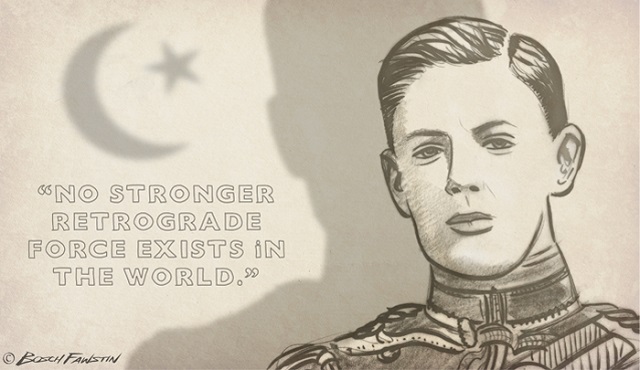Winston Churchill and Islam—Part One
By Jihad Watch

n late 2001, I was sitting in the private library of the late David Littman, husband of the distinguished historian Bat Ye’or, in their beautiful villa overlooking Lake Geneva (Switzerland), when David received a phone call from his friend the official biographer of Sir Winston, Sir Martin Gilbert. Gilbert cited a memorable passage from The River War, about Islam and its votaries (which I shall quote later in this article). It was the first time I had heard this quotation. Since then, of course, it has circulated on the internet, and must be by now familiar to most readers of Jihad Watch. However, imagine my disappointment when I finally acquired a copy of The River War, I could not for the life of me find the oft-quoted passage. I suspect many readers of Jihad Watch had a similar experience. In fact, I had been desperately searching in what turned out to be the abridgment of The River War, first published in 1902 in London, also by Longmans, Green, and Co. There then followed other abridged editions, such as the ones in 1933, London: Eyre & Spottiswoode, and New York: Charles Scribner’s Sons, both carrying new forewords by Churchill. Even the ever-enterprising Gutenberg Project, which offers over 70,000 free eBooks, has only the 1902 edition of Churchill’s work.
It was only in 2020 that the original unabridged edition of 1899 was once again available, thanks to St. Augustine’s Press (South Bend: Indiana) and the combined efforts and enthusiasm of various scholars and institutions. I shall be quoting from this definitive edition.
St. Augustine’s Press advertised Churchill’s book several years ago, but each time I checked their online catalogue they kept delaying the date of publication, until I was convinced it would never be published, perhaps because of pressure from irate Muslim lobbies. But here it is at last. This edition is a tremendous work of scholarship, and is indeed likely to be the definitive edition, well worth the wait and price of $150.00 for the two volumes.
This edition highlights in red everything that Churchill cut out from all later editions, with the rest of the text printed in black. Some new appendices give the original wording of Churchill’s fifteen dispatches to the Morning Post on which he based “The River War.”
This re-edition of the original text of 1899 is much more than simple autobiography — Churchill himself participated in the historic charge of the 21st Lancers, last great cavalry charge of the British Empire — but is also a comprehensive military history of the whole of the Anglo-Egyptian campaign against the Sudanese Dervishes from 1885 to 1899.
As Churchill wrote in My Early Life, “I was a child of the Victorian era, when the structure of our country seemed firmly set, when its position in trade and on the seas was unrivalled, and when the realisation of the greatness of our Empire and of our duty to preserve it was ever growing stronger. In those days the dominant forces in Great Britain were very sure of themselves and their doctrines. They thought they could teach the world the art of government, and the science of economics.”[1]
Churchill entered Sandhurst, a leading military training academy, on 1 September 1893, and had graduated from it in December 1894. On 1 April 1895, Second Lieutenant Churchill was gazetted to the 4th Queen’s Own Hussars, a regiment which had fought in the Peninsular War and taken part in the Charge of the Light Brigade. They were posted to Bangalore, India in September 1896.
Churchill learnt that a Pathan or Pashtun revolt had broken out on the North-West Frontier and had led to Sir Bindon Blood being given the command of a three-brigade Malakand Field Force [MFF], whose task it was to punish the Pathans or Pashtuns for their frequent raids on British-controlled areas.
Britain’s main worry in the 19th Century was to protect her colonial possession, India, from incursions from Afghanistan and ultimately from possible raids from Russia. The rugged, rocky mountains of the N.W. Frontier Province formed a natural barrier between Afghanistan and India, consequently any power that controlled the mountains controlled the gateway to India, Britain’s prize possession. But the Pashtun tribes of Afghanistan were, as the Imperial Gazetteer of India summarized, “full of resolution, their bearing proud and apt to be rough. Inured to bloodshed from childhood, they are familiar with death, audacious in attack, but easily discouraged by failure. They are treacherous and passionate in revenge …They are much under the influence of their Mullas, especially for evil.”[2]
AUTHOR
IBN WARRAQ
[1] Churchill, My Early Life, p.ix.
[2] Quoted by Con Coughlin, Churchill’s First War. Young Winston and the Fight against the Taliban. London: Macmillan, 2013, p.25.
RELATED ARTICLES:
Spain: Accused gang rapists reported to be ‘Germans’ turn out to be Muslim migrants
Germany: Muslim migrant writes in major newspaper that women licking ice cream is ‘obscene’
EDITORS NOTE: This Jihad Watch column is republished with permission. ©All rights reserved.

This article is courtesy of DrRichSwier.com, an online community of citizen journalists, academics, subject matter experts, and activists to express the principles of limited government and personal liberty to the public, to policy makers, and to political activists. Please visit DrRichSwier.com for more great content.

